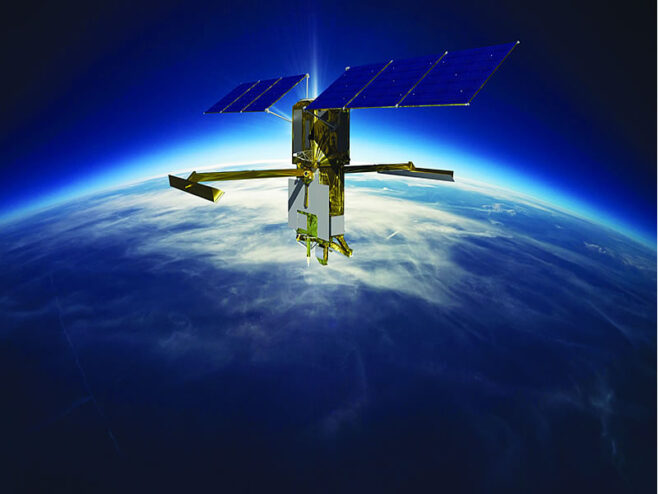The Philippines held its first space cooperation conference on March 19, 2024 as the country seeks to explore opportunities presented by the heavens.
The conference was organized by the Stratbase Albert del Rosario Institute for Strategic and International Studies, a Metro Manila-based think-tank; the fledgling Philippine Space Agency; and the Canadian Embassy in the Philippines.
“By harnessing the power of satellites, space agencies and international partnerships such as the one that we have with the embassy of Canada today, we have the opportunity to revolutionize our capabilities at sea,” Stratbase president Dindo Manhit said in a speech.
Stratbase shared on social media excerpts of Manhit’s talk at the conference held at the Manila Polo Club in the city of Makati.
“From tracking vessels in real time to detecting illegal fishing activities and monitoring environmental changes, space-based assets offer unparalleled insights into the dynamics of our maritime areas,” Manhit explained.
Canada is eager to seek ways on collaborating with the Philippines on space programs.
Journalist Bernadette Tamayo of the Manila Times newspaper reported that Canada is interested to deepen ties with the Philippines in many areas, including space.
Canadian Ambassador the Philippines David Hartman stated in the report that “success will be dependent on international collaboration and cooperation”.
“We will continue to explore opportunities to deepen our relationship in multiple forums to further advance our respective national objectives both here on Earth as well as in outer space,” Hartman said.
“Canada is proud to be a reliable partner of the Philippines,” Hartman also said in the Manila Times report.
The conference was titled “Navigating the Frontiers of Global Space Collaboration and Promoting Space Science and Technology Applications Across Industries”.
One of the speakers at the event was Sarah Pacey-Parker, manager of international relations with the Canadian Space Agency.
The CSA is a federal agency that manages Canada’s civil space-related programs.
The space agency was established in March 1989. It is headquartered in Longueuil, Quebec.
The Philippine Space Agency (PhilSA) is a new agency created under Republic Act No. 11363.
Also known as the Philippine Space Act, the law was signed on August 8, 2019.
The Philippine space program has a number of key development areas: national security and development; hazard management and climate studies; space research and development; space industry and capacity building; space education and awareness; and international cooperation.
“Through international partnerships and collaborations, the Philippines will become a key player in the Association of Southeast Asian Nation (ASEAN) and global space community by providing significant contributions and capabilities on space S&T applications,” PhilSA states on its website.
In a promotional writeup for the conference, Stratbase noted that space science and technology applications have “facilitated breakthrough achievements” in addressing various challenges.
“The significance of these technologies cascade from mitigating the impacts of climate change, developing early-warning systems for disasters, ensuring food security through sustainable resource management, promoting maritime domain awareness, and boosting communications and internet connectivity through satellites among others,” the think-tank explained.
“Through robust national policies, investment in talent and technology, and collaboration with partners, the Philippines can seize the opportunity to carve out a significant role in space exploration.”
In his speech, Stratbase’s Manhit said that the space industry “warrants attention especially in the wake of rapid technological advancements”.
“It is our hope that this conference would be the start of discussions on the relevance of space science and technology applications across different sectors. By encouraging more dialogue and collaboration in these areas, we can make use of space science and technology applications to address global challenges,” Manhit said.
The Manila Times report of journalist Tamayo quoted PhilSA director general Joel Marciano Jr. citing the European Commission National Copernicus Capacity Support Action Program for the Philippines (CopPhil) as the first space cooperation program in Asia.
Marciano said that this particular space cooperation program “strengthens the space data value chain in the Philippines”.
“[CopPhil] is very important for early warning, for example, for extreme weather phenomenon, as well as improving climate resilience,” Marciano said.
By Carlito Pablo








